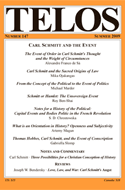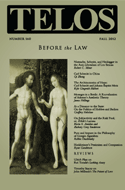 Central to Carl Schmitt’s geophilosophy is his view that law is intrinsically linked to the physical location. This connection between the terra firma and the law is an essential element of what he refers to as nomos. Schmitt sees this as the most authentic form of law, distinguishable from views that perceive law as a normative or positive regime. In his article “Carl Schmitt and the Sacred Origins of Law,” Mika Ojakangas elucidates Schmitt’s conception of nomos, its relation to Schmitt’s view of mythopolitical legitimization of the state, and the consequences of rejecting the notion of such a link by secularization.
Central to Carl Schmitt’s geophilosophy is his view that law is intrinsically linked to the physical location. This connection between the terra firma and the law is an essential element of what he refers to as nomos. Schmitt sees this as the most authentic form of law, distinguishable from views that perceive law as a normative or positive regime. In his article “Carl Schmitt and the Sacred Origins of Law,” Mika Ojakangas elucidates Schmitt’s conception of nomos, its relation to Schmitt’s view of mythopolitical legitimization of the state, and the consequences of rejecting the notion of such a link by secularization.
|
Robbie Duschinsky’s “Pure and Impure in the Philosophy of Giorgio Agamben” appears in Telos 160 (Fall 2012). Read the full version online at the Telos Online website, or purchase a print copy of the issue here. |
||||
|
Telos Press Publishing · PO Box 811 · Candor, NY 13743 · Phone: 212-228-6479 Privacy Policy · Data Protection Copyright © 2025 Telos Press Publishing · All Rights Reserved |
||||
 The issue of the “ambiguity of the sacred” plays a significant role in Giorgio Agamben’s thought. Both the importance of the pure and impure to Agamben, and the nature of his theory of this issue, are revealed more clearly in his recent text Il Sacramento del Linguaggio. In contrast to functionalist explanations of themes of purity and impurity as an expression and affirmation of the social order (e.g., Emile Durkheim, Mary Douglas), Agamben considers purity and impurity as essentializing discourses. They contribute to the establishment of a transcendent but empty ideal, as the mandate for the social and political governance of individuals. In the course of this analysis, Agamben offers many philosophical reflections on purity and impurity that will be of note to researchers across the social sciences and humanities.
The issue of the “ambiguity of the sacred” plays a significant role in Giorgio Agamben’s thought. Both the importance of the pure and impure to Agamben, and the nature of his theory of this issue, are revealed more clearly in his recent text Il Sacramento del Linguaggio. In contrast to functionalist explanations of themes of purity and impurity as an expression and affirmation of the social order (e.g., Emile Durkheim, Mary Douglas), Agamben considers purity and impurity as essentializing discourses. They contribute to the establishment of a transcendent but empty ideal, as the mandate for the social and political governance of individuals. In the course of this analysis, Agamben offers many philosophical reflections on purity and impurity that will be of note to researchers across the social sciences and humanities. 

